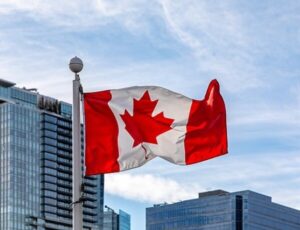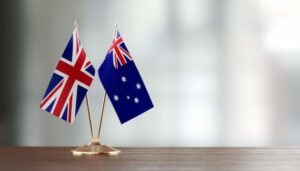
Prices for residential real estate in the UK in November rose by the highest since November 2022 by 3.7% in annual terms, according to a report by the British mortgage company Nationwide Building Society. The indicator has been growing for the tenth month in a row, in October the growth was 2.4%.
The consensus forecast provided by Trading Economics assumed that the growth rate would remain at the October level.
Compared to the previous month, house prices increased by the highest since March 2022 by 1.2% after rising by 0.1% in October and now average 268,144 thousand pounds ($340.2 thousand) per property. This is only 1% below the historical high recorded in 2022.
“The acceleration in house price growth is surprising as affordability remains low by historical standards,” said Robert Gardner, senior economist at Nationwide. ”House prices remain high relative to average earnings and interest rates are well above pre-COVID levels.
http://relocation.com.ua/tsiny-na-zhytlovu-nerukhomist-u-velykij-brytanii-v-lystopadi-zrosly-na-3-7/

The United Kingdom has fallen to seventh place in the world in terms of the total capitalization of companies traded in the country, passing the Canadian market, Bloomberg writes.
Since the beginning of the year, the market value of companies traded in Canada has increased by 11% to $3.22 trillion.
The British stock market, which was once among the world’s leaders, is also inferior to the United States, China, Japan, Hong Kong, and India. Last year, it also passed France, but due to the difficult political situation in the neighboring country, the UK regained its status as Europe’s largest equity market earlier this year.
Over the past decade, Canadian companies have increased their capitalization by about $1 trillion, while British companies have lost about the same amount.
Brian Madden, head of First Avenue Investment Counsel, attributes this mixed performance to the UK’s decision to leave the European Union. In addition, the tech sector has an extremely small share in the main British stock index, the FTSE 100, at only 1% compared to 8.4% in Canada. In the US stock index S&P 500, high-tech companies have a share of about 30%.
Bloomberg notes that since 2022, there has not been a single IPO in Canada. However, during the same period, the Toronto Stock Exchange lured 51 companies from competing trading platforms.
Meanwhile, London still ranks second in the ranking of the world’s largest financial centers, second only to New York. Toronto ranks 23rd on the list. In addition, 11% of all global assets are managed from the UK.

On Thursday, the Verkhovna Rada completed the internal procedures necessary for the entry into force of the Agreement on Political Cooperation, Free Trade and Strategic Partnership between Ukraine and the United Kingdom in terms of trade liberalization: by 2029, all import duties and tariff quotas in bilateral trade are to be abolished, the Ministry of Economy reported.
It is specified that the agreement will be in effect until March 31, 2029, with the exception of two commodity items – eggs and poultry products, the liberalization of trade with which will be extended for two years – until April 1, 2026.
“Ukraine will also have the opportunity to plan export logistics more flexibly and increase exports of high value-added goods in the future,” the Ministry of Economy believes.
The ministry predicts a revival of trade between Ukraine and the UK and an increase in exports of domestic products traditionally supplied to the British market by domestic producers. In particular, these include flour, grain, dairy products, poultry and semi-finished products, tomato paste, honey, corn, wheat, juices, sugar, etc.
The Ministry of Economy reminded that Agreement No. 3 in the form of an exchange of letters amending the Agreement on Political Cooperation, Free Trade and Strategic Partnership between Ukraine and the United Kingdom of Great Britain and Northern Ireland in terms of commitments to trade liberalization was ratified by the Rada on February 8 this year.

An exit poll conducted by Ipsos UK for Sky News, BBC, and ITV News predicts that the opposition Labor Party will win 410 seats in parliament, the BBC reports.
“If the prediction is correct, Sir Keir Starmer will become prime minister with 410 Labor MPs, slightly less than Tony Blair’s total in 1997,” the report says.
It is noted that the Conservatives may avoid the defeat predicted by some opinion polls, but their predicted result will be a crushing blow to the party after 14 years in power. According to exit polls, the Conservatives will win 131 seats in parliament, the lowest number in history. The Liberal Democrats are expected to take third place with 61 seats.
In addition, according to exit polls, the number of Scottish National Party MPs will decrease to 10, while Reform UK is projected to gain 13 MPs. The Green Party of England and Wales is expected to double its number of MPs to two, and Plaid Cymru will get four MPs. Others are projected to win 19 seats.
The exit poll is based on voter data from approximately 130 polling stations in England, Scotland and Wales. The poll does not cover Northern Ireland.
The UK election took place on Thursday, July 4. Most of the results will start coming in on the morning of Friday, July 5.
Earlier, Experts Club presented an analytical material on the most important elections in the world in 2024, a detailed video analysis is available here – https://youtu.be/73DB0GbJy4M?si=eGb95W02MgF6KzXU
You can subscribe to the Experts Club YouTube channel here – https://www.youtube.com/@ExpertsClub

The British people will go to the polls on Thursday to determine the new composition of the Parliament. Polling stations will be open from 07:00 to 22:00 local time (09:00 to 00:00 CET). The British parliament is elected for five years and one party needs to win 326 seats out of 650 for a majority.
The first preliminary results are expected around 23:30 (01:30 CET), and updated data is expected to be published between 03:00 and 05:00 (05:00 and 07:00 CET). Western media note that it is usually after the publication of such updated information on the voting results that the leader of the losing party concedes defeat.
On Friday morning, the leader of the winning party is expected to travel to Buckingham Palace to inform King Charles III that he is ready to form a government.
The pre-election polls were extremely unfavorable for the Conservatives: according to several media outlets that compiled polls from various opinion companies, Labor could get about 40% of the vote, the Conservatives about 20%, and the Reform the UK party about 16%.
At the same time, experts from Survation said that they can say with 99% confidence that Labor will win with a huge margin. According to their latest poll, given the current rules for distributing votes in the election, the Labor Party could win 484 seats out of 650 (about 75% of the seats). In this scenario, the Conservative Party would receive only 64 seats (about 10%), which could be the worst result in their history.
Thus, the Reform the UK party, headed by Nigel Farage, may, under a favorable set of circumstances, overtake the Conservatives in the elections and become the second most important political party in the country. Farage’s party is mainly focused on immigration and the continuation of Brexit.
At the same time, changes are expected from Scotland and Northern Ireland. The Scottish National Party (SNP), which is experiencing an internal crisis, may lose some seats in the British Parliament to Labor. At the same time, the left-wing nationalist party Sinn Fein may win the majority of seats in the parliament for the first time in history from Northern Ireland. The party adheres to the policy of abstentionism, which means that if it wins, it will not de facto take its seats.
Pre-election polls in Wales do not predict any radical changes.
According to British voters, the most important problems in the kingdom are currently the economic situation (about 52% said so), the healthcare situation (50%), and immigration and asylum issues (40%). At the same time, the British media note that in their election promises, both Labor and the Conservatives do not pay enough attention to the country’s main problems.
Labor leader Keir Starmer promises to reform several sectors, including the National Health Service, and to raise taxes to invest in these areas. The leader of the Conservatives, Prime Minister Rishi Sunak, promises to cut taxes.
At the same time, the positions of the two parties on Russia’s full-scale war against Ukraine do not differ much: Sunak promised to stand by Ukraine “no matter what it takes,” while Starmer repeatedly said that his support for Kyiv is “ironclad.” The Labor Party’s manifesto states that it is ready to work with the Ukrainian government to diplomatically isolate Russia and increase industrial production. Labor is also ready to work to create a path to Ukraine’s membership in NATO.
At the same time, Farage said that Russia and Ukraine should try to organize a negotiation process by using mediators. He criticized NATO’s eastward expansion and said that Ukraine, in his opinion, should act as a buffer state between Russia and the West in the future.
Political problems for the Conservative Party began at the end of 2021, when Boris Johnson, who was then Prime Minister, resigned due to his participation in parties during the COVID-19 lockdown and the scandals that followed. Liz Truss took over as prime minister in September 2022 and was replaced by Sunak in October. The Conservative Party has been in power in the UK for about 14 years.
In late May, Sunak announced his intention to hold general elections on July 4, a decision that came as a surprise to many. The previous parliament convened in December 2019, so the prime minister had until December to decide.
Earlier, Experts Club presented an analytical material on the most important elections in the world in 2024, a more detailed video analysis is available here – https://youtu.be/73DB0GbJy4M?si=eGb95W02MgF6KzXU
You can subscribe to the Experts Club YouTube channel here – https://www.youtube.com/@ExpertsClub

The UK general election will be held on July 4, King Charles III has already approved the dissolution of Parliament, British Prime Minister Rishi Sunak said.
“Earlier today, I spoke to His Majesty King Charles III to request the dissolution of Parliament. The King has granted this request. We will hold a general election on July 4,” said Sunak, speaking in Downing Street.
“This is the moment for Britain to determine its future,” he emphasized.
The election campaign will begin in the country after the dissolution of Parliament.
According to Sky News, on Downing Street there were “long and open discussions” about whether to hold elections now or in the fall. Deputy Prime Minister Oliver Dowden, for example, has been pushing for a summer election.
Earlier in May, the Conservative Party of the current British Prime Minister lost almost half – 474 – of the seats in local councils in the English elections. The Conservatives had about 1,000 seats in English councils so far.
The Liberal Democrats gained an additional 104 seats, while the Greens gained 74 seats. In addition, taking advantage of the Conservatives’ failure, some smaller parties improved their positions.
Then the head of the British opposition Labor Party Keir Starmer spoke in favor of a general election in the UK.
Sunak holds the post of British Prime Minister since October 2022.
Earlier Experts Club analytical center presented an analytical material about the most important elections in the countries of the world in 2024, possible elections in the UK were among the top 5 most important elections in the world in 2024, more video analysis is available here – https://youtu.be/73DB0GbJy4M?si=eGb95W02MgF6KzXU Subscribe to Experts Club YouTube channel here – https://www.youtube.com/@ExpertsClub